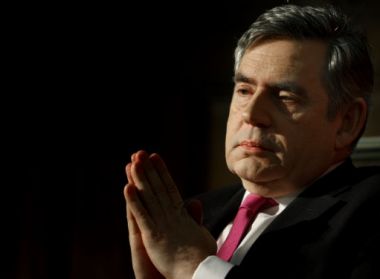Independence: How Gordon Brown invoked his Christian values to help save the Union

If anyone has been "born again" to politics in the Scotland debate, it is Gordon Brown.
The former Prime Minister's powerful speech shortly before the vote was a secular version of a Bible-thumping "preach-it" sermon in the great tradition of the Scottish cleric.
Brown is now being credited widely with having saved not so much the soul of the Union, as the Union itself.
It is an irony that will be recognisable to Christians, servants to a theology of victory through self-sacrifice, that this secular politician was at his most influential when he technically had the least power.
Brown, raised in a Church of Scotland manse in Kirkaldy and strongly influenced by his father, Rev John Ebenezer Brown, is according to Patrick Wintour of The Guardian now in pole position to be hailed as the man who saved the union.
Brown, currently Labour MP for Kirkcaldy and Cowdenbeath, has already drawn up proposals for a new constitutional settlement in the UK, including a new role for an elected House of Lords to arbitrate disputes between England, Wales, Scotland and Northern Ireland. He is expected to play a leading role in debates in Parliament on the future of the Union, which according to Wintour could include a power-sharing partnership that he describes as home rule within the UK. He is already in regular contact with David Cameron and Nick Clegg over the plans.
Wintour writes: "Until two weeks ago his plans might have quickly gathered dust, but the sudden transformation in his reputation from a failed prime minister to a visionary has given him a renewed influence."
Other influential commentators agree.
After the vote Tom Bradby, political editor of ITV News, tweeted:
I think history is going to be pretty kind to Gordon Brown, a man who can credibly claim to have saved the financial system and the Union.
— tom bradby (@tombradby) September 19, 2014In fact, one might argue history will be kind to both Major and Brown, but not Blair. Funny how things turn out.
— tom bradby (@tombradby) September 19, 2014The Church of Scotland, which played such a strong influence in forming the character of Gordon Brown, has like him gained political credibility and social capital over its conduct throughout the debate. The Church is now moving centre stage as it builds on its objective and compassionate impartiality to foster healing, with a service of reconciliation planned at St Giles' Cathedral in Edinburgh on Sunday.
The moderator, John Chalmers, will preach a message of "healing where there has been hurt and unity where there has been division." Chalmers said: "The Church of Scotland, as a national church, is well placed to bring people back together in a spirit of reconciliation."
The Archbishop of Canterbury Justin Welby said: "Over the past few weeks the campaign has touched on such raw issues of identity and been so closely fought that it has generated profound questioning and unsettlement far beyond Scotland.
"The decision by the Scottish people to remain within the United Kingdom, while deeply disappointing to many, will be welcomed by all those who believe that this country can continue to be an example of how different nations can work together for the common good within one state.
"This is a moment for reconciliation and healing not rejoicing or recrimination. Some of the wounds opened up in recent months are likely to take time to heal on both sides of the border. "
There have historically been close relationships between the Scottish Episcopal Church, the Church of Scotland and the Church of England.
All churches and faiths, including the Roman Catholic church leaders, will be consulted closely as a restructuring of the relationship between Scotland and the rest of the UK now takes place.
In his speech at the Love Scotland Vote No rally in Maryhill Community Central Hall, Glasgow, Brown said: "I want to tell the people of Scotland of that patriotic vision of the future of Scotland. Proud of our Scottish identity. Proud of our distinctive institutions. Proud of the Scottish Parliament we have created. Proud, that with the powers we have given it and without the need of separation, the NHS in Scotland will always be in public hands, properly funded and free at the point of need forever or as long as the people of Scotland want it. And proud we are increasing the powers of that Parliament – decided tomorrow with a 'No' vote, delivery the day after tomorrow – which will mean faster, better and safer change than the uncertainty and disruption offered by the Nationalists."
Using language which echoed the marriage service of 1662 Book of Common Prayer, he described Scotland as "a nation forever – yesterday, today and tomorrow."
He continued: "So let us tell people of what we have done together. Tell them that we fought and won a war against fascism together. Tell them there is no war cemetery in Europe where Scots, English, Welsh and Northern Irish troops do not lay side-by-side. We fought together, suffered together, sacrificed together, mourned together and then celebrated together. And tell them that we not only won a war together – we built a peace together, we created the NHS together, we built a welfare state together. We did all this without sacrificing within the union our identity, our culture, our tradition as Scots. Our Scottishness is not weaker, but stronger as a result. And what we created together, let no nationalist split asunder."
He added: "This is not a vote just for one time, this is a vote for all time. Because this vote cannot be undone or redone, this cannot be a vote just for us, this generation and this time. When there's no going back I have to take into account my children, our future and the century ahead."











